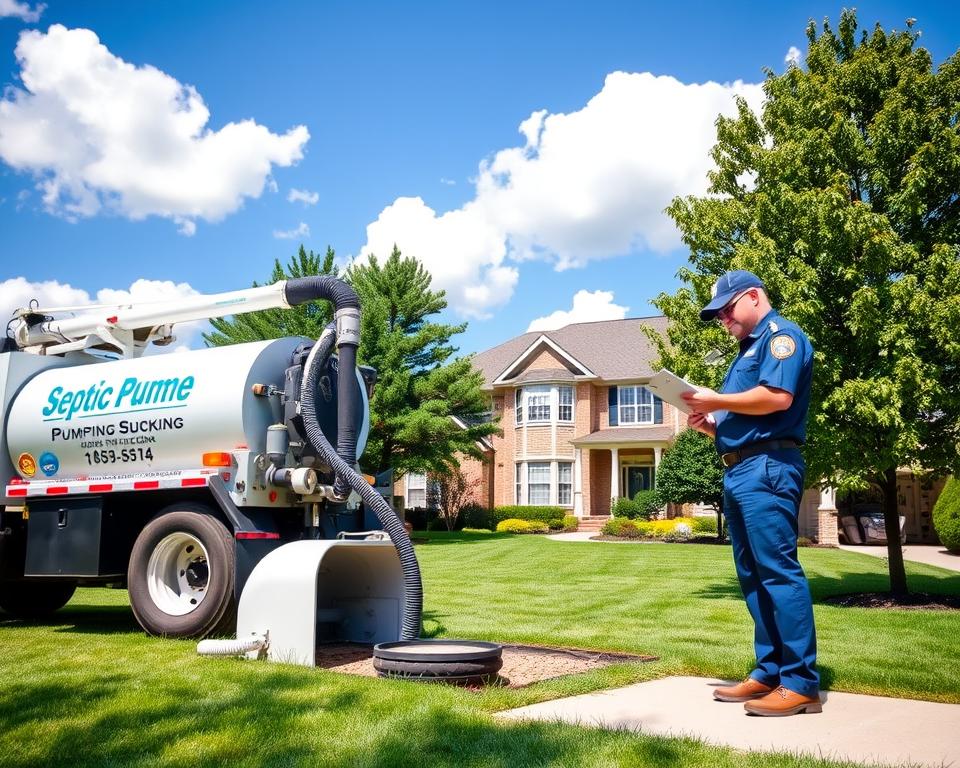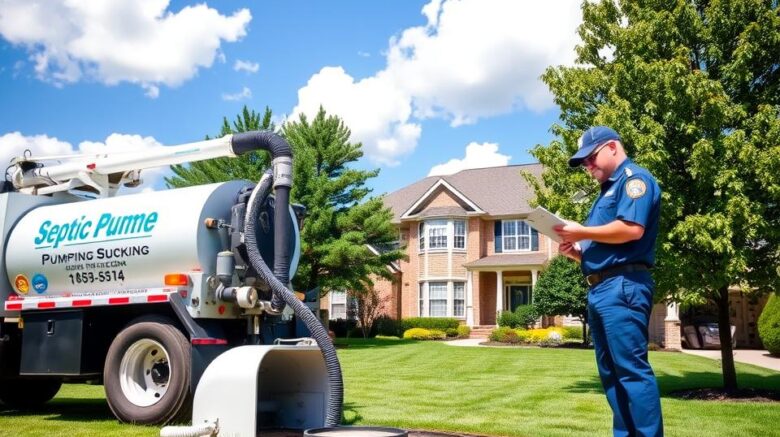Preserve Septic System Cleaning for Tank Health
Ever wondered regarding the effects of overlooking septic system upkeep? For homeowners relying on these systems for waste management, skipping routine care can result in substantial bills. It also poses hazards to both public safety and the environment. Pumping your septic system isn’t just a basic task; it’s essential for ensuring your residence operates efficiently. By regularly clearing out your septic tank, you prevent solid waste collection and extend the lifespan of your system. This preventive stance helps you sidestep any undesirable scenarios. Discover the importance of septic tank upkeep and the process required with septic tank inspection near me.
Major Insights
- Routine septic system pumping is vital for avoiding costly fixes.
- Neglecting upkeep can lead to health hazards for your loved ones.
- Comprehending your septic system aids in effective maintenance.
- Indicators of a malfunctioning septic system should be recognized quickly.
- Licensed services can help in preserving optimal tank health.
Grasping Your Septic System
A septic system is an efficient onsite solution for processing wastewater. It mainly consists of two sections: the septic tank and the leachfield. Both are essential for delivering adequate purification and preserving the environment.
The septic tank gathers wastewater from your home. Inside,, solid particles settle to the base, and liquids drift to the surface. Bacteria within the tank decompose the organics, making the outflow easier to handle. This pre‑treated wastewater then flows to the drainfield for further purification by the ground, completing the treatment.
It’s crucial for homeowners to understand the dynamics of their septic system. Grasping how the septic tank and leachfield operate as a unit can lead to better system care. This insight supports proper maintenance methods, helping guarantee the system’s durability.

Significance of Consistent Septic System Cleaning
Consistent maintenance of the septic system is key for domestic and ecological health. If overlooked, untreated wastewater can spill into your yard. This overflow may result in groundwater contamination, creating dangerous conditions. By maintaining the septic system clean, you shield your family and the community.
It’s suggested to pump the septic system every three‑to‑five years, based on how much you load it. Such maintenance is not just good for the planet; it heads off big bills. A septic system that’s well‑maintained operates better, ensuring a safer living space and a safer environment.
Indicators Your Septic Tank Needs Service
Homeowners need to spot signs that their septic tank may need servicing. Key symptoms to look out for are:
- Sluggish water flow in basins, bathtubs, and toilets
- Foul stenches near the absorption area
- Wastewater returns in household plumbing
- Prolonged soggy spots or lush sections of grass on top of the septic system
It’s critical to spot these signs quickly to avert serious septic tank failures. Scheduled inspections are vital. They detect issues before they escalate to costly fixes. Examining your system consistently guarantees it functions well and lasts longer.
Keeping watch and moving promptly are key for septic system upkeep. By monitoring these alerts, you can preserve your septic system in optimal health.
Septic System Cleaning Frequency
Servicing your septic system consistently is key to keeping your home’s plumbing in top shape. Experts generally advise pumping the septic tank every 3‑5 years. However, this can change based on the number of your home, how much water you use, and the capacity of your tank.
If you have a larger household that consumes more water, you might need to service the system at shorter intervals. Tracking your water consumption can let you determine if you need to modify your cleaning schedule.
All in Sanitation recommends setting up a steady pumping schedule that fits your household’s particular needs. Adhering to a routine maintenance program helps keep your septic system running effectively and avoids hefty repairs.
Septic System Cleaning: Top Tips
For a septic system to remain healthy, homeowners must practice key guidelines. It’s critical not to flush non‑degradable materials; doing so prevents obstructions and ensures the system working well. Similarly, minimizing harsh chemicals keeps the necessary bacterial ecosystem. These actions are vital for the system’s life span and effectiveness.
Being proactive with routine inspections is essential. Setting up routine assessments can detect issues early, enabling prompt solutions. Additionally, saving water through repairing drips and conscious usage boosts septic tank health. These measures guarantee the system functions efficiently for a long time.
It’s also essential not to drive on the drainfield. Leaving this area unobstructed lets it effectively process effluent, shielding your system from issues. Listening to advice from specialists like All in Sanitation also enhances septic system care.
The Steps of Septic Tank Pumping
For homeowners, learning the septic system cleaning process is important. A licensed septic pumper should handle scheduled septic tank pumping to ensure your system running smoothly. The first step is checking the tank’s status to decide when it requires pumping.
A septic tank needs pumping once the solids fill about a third to one‑half of its capacity. The licensed septic pumper will then clear out these deposits. This procedure keeps the system’s effectiveness. Furthermore, the appointment may include examining the tank for potential issues, enabling immediate fixes.
Holding a log of each pumping visit is smart. This log lets owners track their septic system’s service history, and is useful if selling the property. Adequate septic system maintenance boosts its longevity and performance, heading off expensive fixes later on.
Septic Tank Check‑Up: What to Examine
Routine inspections are crucial for your septic system’s health. Using a comprehensive septic tank inspection checklist can detect potential issues early. Inspections should be carried out by a certified professional every 1‑2 years. They will gauge sludge levels and the floating layer during this check.
Checking the internal baffles and effluent filters is also vital. These elements are essential for your septic system’s efficient function. Finding seepage or failures promptly can prevent large repair costs. Forward‑thinking steps, like following an inspection checklist, boost your system’s lifespan and effectiveness.
Expert Septic System Services
Using specialized septic system services is essential for your septic system’s efficiency. By selecting a company like All in Sanitation, you make sure that experts manage the pumping, inspections, and fixes carefully. Accredited technicians have specialized knowledge, allowing homeowners to sustain the system’s best functionality over the years.
Maintenance by licensed experts cuts the risk of unexpected failures and expensive repairs. These services incorporate detailed inspections that assess the system’s state, pinpointing possible problems early. Maintaining this preventive approach substantially prolongs your septic system’s service years.
At the end of the day, handing over your septic system to certified pros offers reassurance. Collaborating with companies such as All in Sanitation taps into their expertise. It guarantees the integrity of your tank, building trust in its maintenance.
Septic System Maintenance Hints for Homeowners
Homeowners have the capacity to keep their septic systems functioning smoothly. Applying smart care hints significantly boosts their function. Implementing easy changes to how we use water, like cutting down on unnecessary use and distributing the use of appliances, reduces strain on the system.
Adding water‑saving faucets in your bathrooms and cooking areas significantly helps septic durability. These fixtures cut down water use without compromising functionality. Avoiding garbage disposals is smart too, as they cause more solids in the system, requiring extra upkeep.
Consistent inspections and following a thorough maintenance plan will lengthen your septic system’s service. Paying attention of everything that flows into your drains is key for keeping a healthy septic environment. By practicing these measures, you’ll significantly support your septic system’s functionality and lifespan.
Common Septic System Fixes
Septic systems may face various problems over time, calling for repairs. Common faults include seepage, damaged baffles, and percolation troubles in the drainfield. By identifying the symptoms at an early stage, homeowners can tackle them quickly, keeping their system stays in good condition.
Typical repairs include:
- Changing out damaged parts to re‑establish system integrity
- Mending or replacing cracked conduits to avoid leaks
- Removing obstructions from clogged lines to guarantee proper drainage
Handling septic issues swiftly not only cuts costs over time but also extends the system’s service years. Regular check‑ups and maintenance can ward off these problems, contributing to the upkeep of a sound septic system.
To Conclude
Keeping your septic system robust is key to environmental and household well‑being. Consistent cleanings and examinations avoid costly fixes and hazards. Being proactive with septic care protects money and lowers concern.
Using specialists like All in Sanitation delivers high‑quality upkeep adapted to your needs. Their expertise aids spot issues promptly, avoiding major troubles and emphasizing the need for scheduled inspections.
Adopting effective habits for septic maintenance delivers long‑term system performance. A bit of maintenance today guarantees a more reliable septic system in the years ahead.
